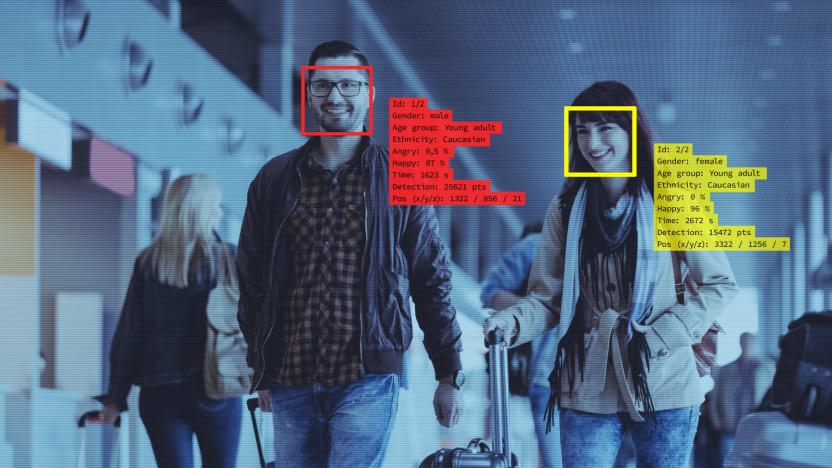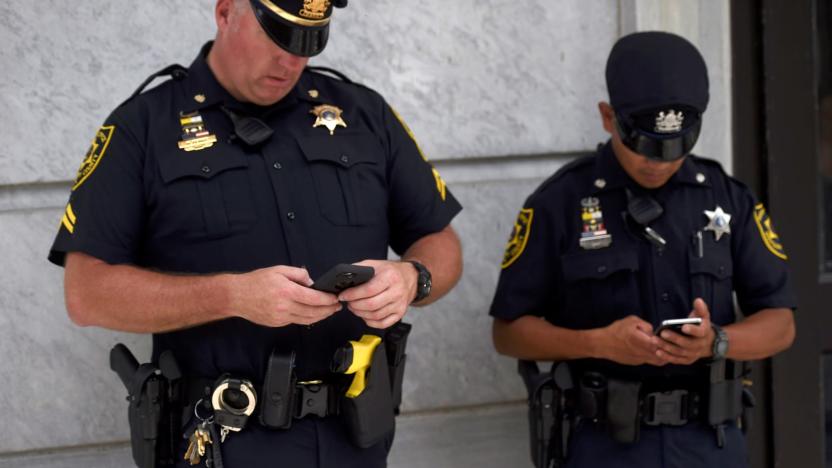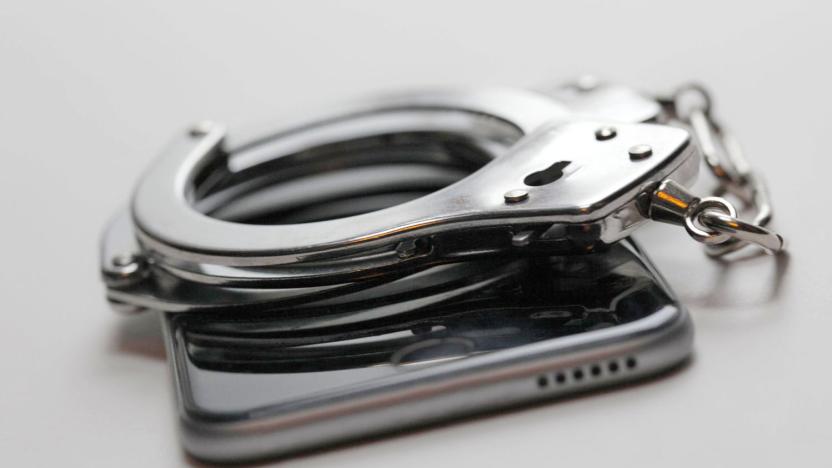evidence
Latest

UK police's facial recognition system has an 81 percent error rate
Facial recognition technology is mistakenly targeting four out of five innocent people as wanted suspects, according to findings from the University of Essex. The report -- which was commissioned by Scotland Yard -- found that the technology used by the UK's Metropolitan Police is 81 percent inaccurate and concludes that it is "highly possible" the system would be found unlawful if challenged in court.

When body cams had bullets
Just as GoPros have given us a whole new perspective on everything from extreme sports to animal behavior, so have body-worn cameras offered new insights into policing. Law enforcement agencies around the world now use body cams to record the activities of officers in the field, though they've only become commonplace in the last few years. But the idea of documenting the volatile situations officers can find themselves in -- providing both evidence against offenders and holding police accountable for their actions -- is much, much older. The first attempts were very different from the body cams of today, however, as releasing the shutter required pulling the trigger of the gun the camera was attached to.

Judge rules NYPD needed a warrant before using cell-site simulator
A Brooklyn judge has ruled that because the New York Police Department (NYPD) used a cell-site simulator, also known by the brand name Stingray, to track down a murder suspect without a warrant, some evidence against the suspect will be thrown out. As the New York Times reports, the NYPD initially denied using such a device in this case, but later conceded that it had. Following the suspect's arrest, he was picked out of a lineup by another victim, and that's what is being tossed out.

Axon hopes you'll submit smartphone video as evidence
In theory, handing your smartphone video over to the police if you have evidence of a crime is the right thing to do -- it provides accountability and could be the key to a conviction. However, those contributions are about to enter a gray area. Axon (the brand formerly known as Taser) has confirmed that it's working on a "Public Evidence Product" that would let you submit photos and videos to Evidence.com, its cloud platform normally used for police footage. That doesn't sound so bad on the surface, but the handling and potential motivations are raising concerns that this amounts to excessive privatization of the justice system.

FBI allegedly paid Geek Squad for evidence
Last May, the defense in a child pornography trial alleged that the FBI used a member of electronics retailer Best Buy's tech support team, Geek Squad, to peer into the accused's computer on the hunt for evidence of child pornography. Since then, the defense's lawyers revealed that the FBI had cultivated at least eight of the company's IT handyfolk over a four-year period to serve as confidential informants, who all received some payment for turning over data. Obviously, this raises serious questions about whether sending devices into the repair shop forfeits a person's right to privacy or unreasonable search and seizure.

Florida court rules police can demand your phone's passcode
A Florida man arrested for third-degree voyeurism using his iPhone 5 initially gave police verbal consent to search the smartphone, but later rescinded permission before divulging his 4-digit passcode. Even with a warrant, they couldn't access the phone without the combination. A trial judge denied the state's motion to force the man to give up the code, considering it equal to compelling him to testify against himself, which would violate the Fifth Amendment. But the Florida Court of Appeals' Second District reversed that decision today, deciding that the passcode is not related to criminal photos or videos that may or may not exist on his iPhone.

LAPD has a new tool for crowdsourcing photo and video evidence
Citizen-provided evidence is clearly on the up. With the amount of cameras knocking about, this is hardly surprising. However, when something goes down at a large public event, the mass of well-meaning user-submitted evidence can cause data bottlenecks, or a stretch of resources making sense of it. This ends up potentially doing more harm than good. The Los Angeles Sheriff's Department has sought to resolve such issues by working with Amazon's Web Service to create an app for submitting photo and video evidence that takes advantage of AWS's deep bandwidth pockets. Called the Large Emergency Event Digital Information Repository (LEEDIR), the web, Android and iOS apps serve as a direct line, and central repository for user-generated evidence. Unsurprisingly, some privacy advocates are twitchy about the idea of bystanders caught on video being implicated, but its creators claim that this is something that professional law enforcement is equipped to deal with such issues as a matter of routine. Currently the app is being used as part of investigations for a recent riot in Isla Vista, but it's hoped it could become a routine tool for similar events in the future.

Privacy group blocks NSA from destroying phone records, calls them evidence
A US judge has temporarily stopped the National Security Agency (NSA) from destroying phone metadata it collected, thanks to an intervention by the Electronic Frontier Foundation (EFF). The privacy watchdog argued that the documents were key to upcoming lawsuits against the spy agency stemming from Edward Snowden's revelations. Ironically, the NSA itself wants to preserve the records for intelligence purposes, but a foreign surveillance court ordered them destroyed. The reason? It judged the records would actually violate the rights of those in the phone lists. However, the EFF claimed that court wasn't aware of an existing order issued in July to keep the documents and another filed back in 2008. A hearing is now scheduled for March 19th to determine if the metadata will be permanently destroyed or not -- with your privacy as the main argument either way.

Apple, Samsung reveal sales data to the court, boast of millions served
Have a smartphone from Seoul or Cupertino riding in the pocket of your jeans? You aren't the only one. New documents filed in Samsung and Apple's ongoing legal battle reveal specific sales data going back several years, confirming something we always knew to be true: there are a lot of devices out there. Samsung's filing reveals that it has sold 21.25 million "accused" phones and 1.4 million tablets from June 2010 to June of this year, and further breaks down the data by device and, in some cases, carrier. The Galaxy S II, for instance, takes the lion's share of US sales with over 4.1 million units sold between all models and carriers. The Epic 4G makes an appearance at 1.89 million sold, and the Captivate totals in at 1.39 million. Finally, the Samsung Prevail lives up to its moniker by netting 2.25 million in sales, lagging only behind the Galaxy S II -- though its $180 asking price brought in significantly less revenue per unit. Apple's charts are a bit less specific, detailing the total sales of its iPhone, iPad and iPod Touch lines rather than the sales of each specific hardware iteration -- though where it falters in detail it makes up in numbers. U.S. consumers have snatched up 85 million iPhones since 2007, alongside 34 million iPads and 46 million iPod touch devices -- bringing in almost $80 billion in revenue, collectively. Puts those quarterly reports into perspective, doesn't it? Check out both charts in full at the source link below.

Apple seizes on Samsung internal document as proof of mimicry
As much as Apple would love for Kwon Oh-hyun to turn up at court and tearfully confess to being a copycat, that's probably not going to happen. Instead, Cupertino's lawyers are burrowing through Samsung's history in search of a legal smoking gun, and one of their latest submissions has been presented as just that. It's a 132-page document written in 2010 by Sammy engineers that directly compares the iPhone against the Galaxy S and makes recommendations about how the latter should be more like the former. The excerpt shown above, which focuses on the aesthetics of icons on the rival handsets, even appears to contain advice about how Samsung should copy Apple without appearing to copy them so much, whereas the full document embedded after the break reveals how all-encompassing the internal guidance was. On the flip-side, Samsung may well argue that any responsible company should compare itself to its competition in this manner, and you can bet there's an army of lawyers beavering away right now to make that sound convincing. [Thanks, Alex]

Taser's on-officer cameras catch you in the act, right to remain silent imperative
Taser International has released an update to its on-officer system, the AXON Flex. The new rig provides law enforcement officials with body-mounted cameras that capture video evidence "from the officer's perspective." These recording devices can be affixed to the hat, collar, shoulder or on specially designed Oakley shades and are ruggedized to IPX2 standards. That's all well and good, but what really gives this setup nerd-cred is what can be done with the captured video. Through a partnership with evidence.com, the Flex system can send footage to a "military grade" cloud-based storage system for safe keeping; there is also an on-site storage option for IT-savvy forces. As if that weren't enough, Taser and Looxcie have co-developed a smartphone app -- available for iOS or Android -- that will allow officers to review captured clips and add GPS coordinates, notes or timestamps. The system's goal is to protect officers from "false claims, enhance public trust [and] decrease litigation." AXON Flex is set to be released in Q1 and will have a base price of around $700. Don't tase film me, bro.

Teenage killer confesses crime in World of Warcraft chat, sentenced to life in prison
Two teenage boys who raped and murdered a fellow classmate in Victoria, British Columbia recently received a sentence of life in prison with no possibility of parole for 10 years. They weren't very smart about covering it up, however, as one of the killers confessed his crime to a guildmate in World of Warcraft chat. He did so because he assumed that those chat logs were less likely to be saved. Kruse Wellwood and Cameron Moffat spent time planning the assault beforehand, and Wellwood even mentioned his desire to do the crime to a guild friend in WoW. Following the 2010 crime, Wellwood logged back in World of Warcraft to talk about the murder to his online girlfriend in Halifax, sending her links of the news reports as proof of his story. Amazingly, his girlfriend mildly chided him to "just don't do it again." The in-game chat logs were part of the mountain of evidence collected by the police. The pair pleaded guilty to the crime.

Apple misrepresents Galaxy S phone in Dutch filing
Apple filed a lawsuit against Samsung in the Netherlands claiming the Galaxy S too closely resembles the iPhone. Unfortunately, the evidence submitted in the case appears to misrepresent the Galaxy S handset. In an image provided by Apple in the filing, the Samsung Galaxy S smartphone is the same size and shape as the iPhone 3G. The shipping version of the Galaxy S, though, is taller and slightly thinner than the iPhone. This is the second faux pas that Apple has made in a legal filing. Earlier this week, it was discovered that the images of the Galaxy Tab Apple provided to a German court did not accurately represent the device. In light of this revelation, the German court temporarily relaxed the ban on the sale of the Galaxy Tab 10.1 in the EU. As of the writing of the post, neither the Netherlands court, Apple nor Samsung has commented on this discrepancy. [Via PC World]

Galaxy Tab 10.1 injunction suspended in EU countries except Germany
The German district court that granted Apple an injunction against Samsung and halted the sales of the Galaxy Tab 10.1 in the EU has temporarily suspended this ban. This suspension applies to all the countries in the EU except Germany. The court decision comes hot on the heels of a report by Webwereld that claimed Apple used flawed images of the Galaxy Tab in its German filing. Apple included images of the Tab that made it appear to be the same size and shape as the iPad. The shipping version of the Galaxy Tab 10.1, though, is oblong in shape and much different from the pictures used by Apple. This potential blunder by Apple could prompt the court to reverse its injunction and allow the sales of the Galaxy Tab 10.1 throughout Europe. [Via FOSS Patents]

Apple's evidence in Samsung case might not match up
The Internet is abuzz with images from Apple's lawyers presented to a judge in Germany that show Samsung's Galaxy Tab allegedly distorted to better match the dimensions of the iPad. Of course, no one but Apple's lawyers, perhaps, know if the images submitted were intentionally doctored or if they were inaccurate for other reasons, but the inaccurate evidence isn't going to do Apple any favors in the German courts, even if it is an honest mistake. Earlier this month a German court blocked Samsung from selling the Galaxy Tab 10.1 across most of the EU in response to an injunction Apple filed. Apple said that the Galaxy Tab 10.1 was a "slavish copy" of the iPad. You can use Photoshop these days to turn anything into a "slavish copy" of the original, but of course if the original comes to light, as it has here, there will undoubtedly be some backpedaling in action. It'll be interesting to see how the German court reacts to the inaccurate pictures, but no doubt Samsung has a smile on its face right now.

Cellphones are dangerous / not dangerous: little tykes under the spotlight
In the rough and tumble debate surrounding the mobile phone's ability to cause cancer, both sides agree that our young ones -- indeed, some of the heaviest users -- could be at an increased risk for cellular-induced tumors. According to a study published in the Journal of the National Cancer Institute, the radio emissions from mobile devices penetrate much deeper into the brains of children, and in the case of little tykes ages five to eight, their noggins will absorb twice the energy of the average adult. This, combined with their developing nervous systems, has brought concern for the welfare of our youngest mobile-savvy citizens, and led to a European study of nearly 1,000 (informed?) participants. Data was gathered over a four-year period, which relied upon self-reporting methods, where youngsters were found to not talk very often, and typically sent text messages instead -- big surprise, right? While long-term risks remain unknown, the researchers conclude that "a large and immediate risk of cellphones causing brain tumors in children can be excluded." In other words: little Suzy won't begin sprouting cancer cells overnight. While you doting parents may find comfort in the latest research, you might consider stopping short of giving the mischievous rascal an unlimited voice plan. After all, gossip still spreads best at the school yard. [Image courtesy Derek Olson (flickr)]

Cellphones are dangerous / not dangerous: Danish chatterbox edition
Concerned that a decade and a half of regular cellphone will have a long-term effect on your health? Hopefully the latest study conducted by members of the World Health Organization (WHO) will put your mind at ease. The examination followed nearly 3 million Danish adults, studying links between phone use and the formation of acoustic neuromas -- non-cancerous, slow-growing brain tumors that form on the main nerve that connects the inner ear to the brain. The study concluded that people who've used a handset for 11-15 years weren't any more likely to develop a tumor than those who don't use cellphones at all, though scientists are unsure that this is a long enough period of time to determine a significant correlation (or lack thereof). Still, this comes as refreshing news two months after the WHO released a study revealing that RF waves coming from phones are "potentially carcinogenic," due to a limited link to glioma and acoustic neuroma. Of course, none of these reports can actually conclude that cellphones cause cancer -- only that the two may be correlated. So, what does this latest study really do? It legitimizes the need to conduct more studies.

Cellphones are dangerous / not dangerous: cancer experts say 'What, me worry?'
If you haven't already gotten whiplash from the ongoing cellphone-cancer debate, a freshly released scientific review might just do the trick. In the paper, published Friday, a panel of experts from Britain, Sweden and the US conducted a thorough survey of previous studies, before concluding that existing literature is "increasingly against" the theory that cellphone use causes brain tumors in adults. The researchers also questioned the biological mechanisms underpinning this hypothesis, while acknowledging some lingering uncertainties, since data on childhood tumors and longer-term research are still lacking. The results come just a few weeks after the World Health Organization released its own literature review, in which it claimed that cell phones should be considered "potentially carcinogenic." But Anthony Swerdlow, a professor at Britain's Institute of Cancer Research and leader of the most recent investigation, said his group's work doesn't necessarily contradict the WHO, since the latter was simply seeking to evaluate cancer risks according to its own "pre-set classification system" -- under which things like pickled vegetables and coffee are also considered "potentially carcinogenic." Unfortunately, this doesn't mean that the debate will die down anytime soon, though Swerdlow expects more definitive conclusions within the next few years -- assuming, of course, that all of our brains haven't turned to oatmeal by then.

Evidence mounts for near-term Gingerbread release on Galaxy S
Gossip is like a wildfire, and we feel its warmth so often that it's easy to disregard. But, when it comes to the Galaxy S getting bumped up to Android 2.3 soon, the heat of this particular inferno is almost impossible to ignore. Word on the interwebs is that Samsung posted a page proclaiming the availability of said upgrade -- only to take it down a few hours later. That's obviously long gone, but now we're also seeing a rather conspicuously labeled official user manual on the company's support site. Add these to Samsung Finland informing us we can expect the update mid-month, and all the pieces of the puzzle are starting to fall into place. Looks like this batch of Gingerbread is almost ready to come out of the oven. [Thanks, S.H. and jonjon]

New York judge rules 'private' Facebook content can be used as evidence in court
Privacy? On the internet!? You've got to be joking. That has, more or less, been the reaction of New York Justice Jeffrey Spinner when faced with the issue of deciding whether or not content posted to the private sections of Facebook and MySpace should be made available as evidence in court. To be honest, it shouldn't come as a shock to anyone, since typically private information -- like emails and home contents -- can regularly be thrown into the public light when there's "a reasonable likelihood" it may turn up evidence material to a trial's outcome. Bring that tradition to the internet -- where publishing anything comes with an inherent desire to disseminate or share that info -- and the lady claiming for personal injuries against a chair company shouldn't be surprised her "private" snaps are being requested. You know, in case they show her doing the limbo on a tropical isle somewhere. Then again, she could always move to California, where a local judge answered pretty much the same question in a converse fashion. Laws, it's all about how you interpret them.














